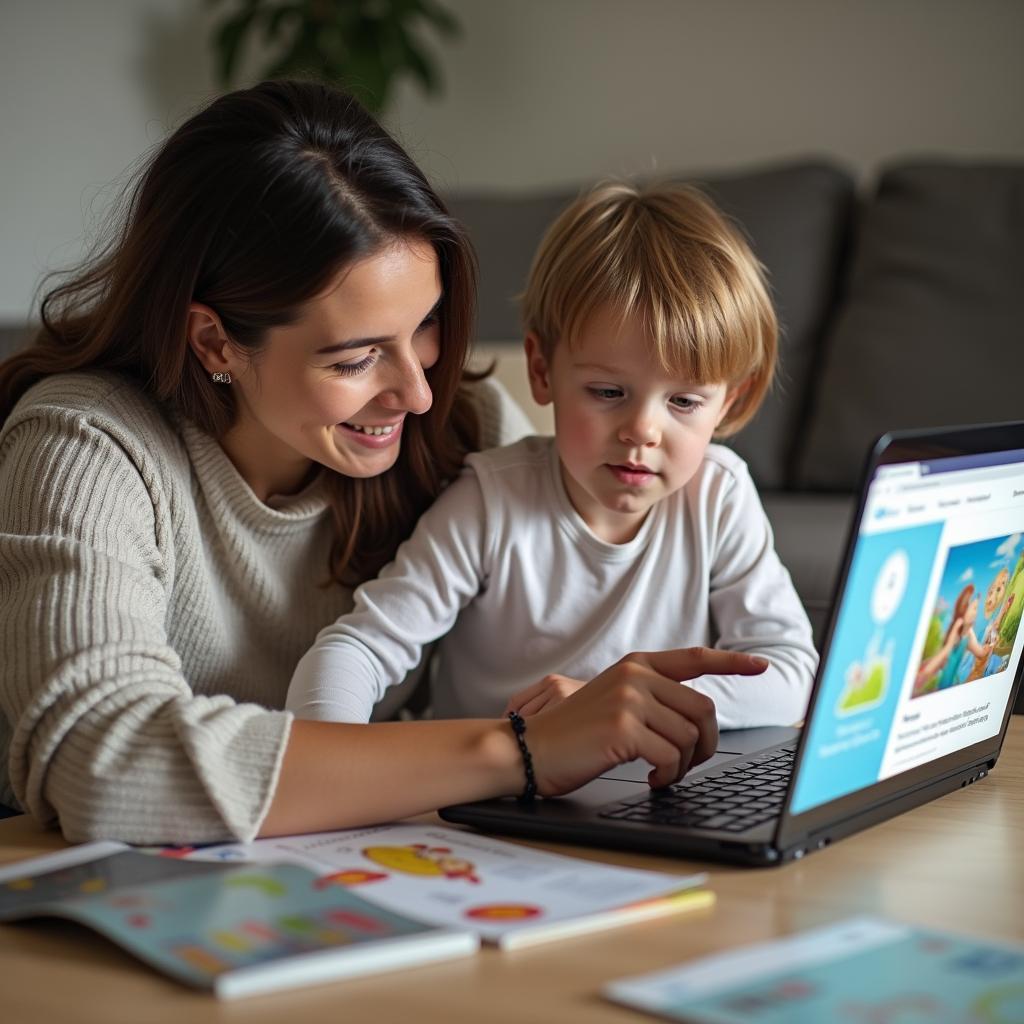The topic of parental control over children’s internet usage has become increasingly prevalent in IELTS Writing Task 2 examinations. Based on analysis of past papers and trends, this theme appears approximately every 3-4 months in different variations. Let’s examine one common question format:
Some people believe that parents should strictly control their children’s use of the Internet, while others think children should be free to use the Internet without parental control. Discuss both views and give your own opinion.
 Parents supervising their child's internet activities at home
Parents supervising their child's internet activities at home
Analysis of Question Requirements
- Topic: Parental control over children’s internet usage
- Task: Discuss both views + personal opinion
- Key points to cover:
- Arguments for strict parental control
- Arguments against parental control
- Personal stance with justification
Band 9 Sample Essay
In today’s digital age, the extent of parental supervision over children’s internet activities has become a contentious issue. While some advocate for strict monitoring, others believe in allowing children complete freedom online. In my opinion, a balanced approach with age-appropriate supervision is most beneficial.
Those who support strict parental control argue that the internet poses numerous risks to children’s safety and development. Unrestricted access can expose young users to inappropriate content, cyberbullying, or online predators. Moreover, excessive screen time may negatively impact academic performance and physical health. For instance, studies have shown that children who use the internet without supervision often struggle with time management and sleep disorders.
Conversely, proponents of unrestricted access maintain that internet freedom is crucial for children’s digital literacy and independence. They argue that overprotection may hinder children’s ability to develop critical thinking skills and digital competence. Additionally, restricting internet access might create a sense of mistrust between parents and children, potentially leading to secretive behavior.
In my view, the optimal approach lies in implementing graduated levels of supervision based on children’s age and maturity. For younger children, strict monitoring is essential to ensure their safety. However, as they grow older, parents should gradually reduce control while maintaining open communication about online safety. This strategy helps children develop responsible internet habits while protecting them from potential dangers.
To conclude, while both extreme positions have their merits, a balanced approach that combines appropriate supervision with growing independence best serves children’s interests in the digital world. Parents should focus on educating their children about online safety rather than implementing blanket restrictions.
Band 7 Sample Essay
The debate over parental control of children’s internet usage has become increasingly important in modern society. This essay will discuss both perspectives on this issue and provide my personal opinion.
Parents who favor strict control believe it is necessary to protect their children from online dangers. The internet contains various inappropriate materials and potential threats, such as violent content and cybercriminals. Furthermore, without supervision, children might spend excessive time online instead of engaging in other important activities like studying or physical exercise.
On the other hand, those against strict control argue that children need freedom to explore the digital world. They believe that excessive restrictions may prevent children from developing necessary digital skills and learning to navigate the internet responsibly. It could also damage parent-child relationships if children feel they are not trusted.
I believe that moderate parental control is the best solution. Parents should monitor younger children’s internet activities closely but gradually give older children more freedom. This approach helps protect children while teaching them to use the internet responsibly. For example, parents could use content filters for young children but later switch to discussing online safety with teenagers.
In conclusion, while both views have valid points, a balanced approach combining some control with gradual independence appears most effective. Parents should focus on teaching safe internet usage rather than implementing complete restrictions or allowing unlimited access.
Band 6 Sample Essay
Nowadays, many people debate about whether parents should control their children’s internet use. Some people think strict control is important, while others say children should use the internet freely. I will discuss both sides and give my opinion.
First, many parents want to control their children’s internet use because it can be dangerous. The internet has many bad things like violent games and bad people. Also, children might waste too much time online and not do their homework or play outside.
However, other people think children should be free to use the internet. They say children need to learn how to use computers and the internet for their future. If parents are too strict, children might not learn these important skills.
I think parents should control their children’s internet use but not too much. Young children need more control to stay safe, but teenage children should have more freedom. Parents should teach children about internet safety instead of just saying no to everything.
To conclude, I believe the best way is to have some control but also give children some freedom to use the internet. This helps them stay safe and learn at the same time.
Key Vocabulary
- contentious (adj) /kənˈtenʃəs/ – causing disagreement or controversy
- cyberbullying (n) /ˈsaɪbəˌbʊliɪŋ/ – using digital communication to bully someone
- digital literacy (n) /ˈdɪdʒɪtl ˈlɪtərəsi/ – ability to use digital technology effectively
- graduated (adj) /ˈɡrædʒueɪtɪd/ – arranged in stages or steps
- overprotection (n) /ˌəʊvəprəˈtekʃn/ – excessive protection
- unrestricted (adj) /ˌʌnrɪˈstrɪktɪd/ – not limited or controlled
- implementation (n) /ˌɪmplɪmenˈteɪʃn/ – the process of putting a plan into action
- cybercriminals (n) /ˈsaɪbəˌkrɪmɪnlz/ – criminals who use the internet to commit crimes
Similar Topics for Practice
- Should children be allowed to use social media?
- Is technology making children less social?
- What age should children be given their first smartphone?
Feel free to practice writing an essay on the main topic and share it in the comments for feedback and discussion.


